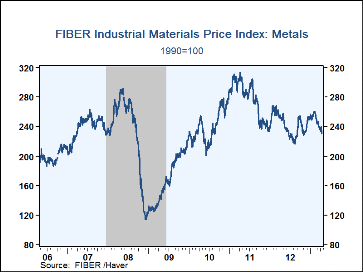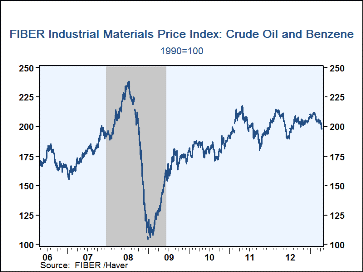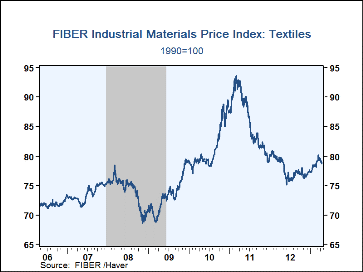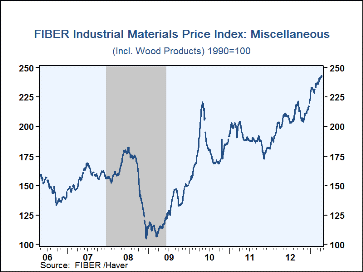 Global| Apr 17 2013
Global| Apr 17 2013FIBER: Industrial Commodity Prices Weaken
by:Tom Moeller
|in:Economy in Brief
Summary
Commodity prices are quite sensitive to changes in the economic environment, and the latest signals suggest softening forward momentum. Yesterday's industrial commodity price index, from the Foundation for International Business and [...]
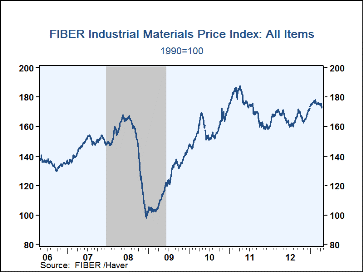 Commodity prices are quite sensitive to changes in the economic
environment, and the latest signals suggest softening forward momentum.
Yesterday's industrial commodity price index, from the Foundation for
International Business and Economic Research (FIBER), was 173.0 and 1.9%
lower than in mid-March. Nevertheless, it still was 3.2% higher than April
of 2012.
Commodity prices are quite sensitive to changes in the economic
environment, and the latest signals suggest softening forward momentum.
Yesterday's industrial commodity price index, from the Foundation for
International Business and Economic Research (FIBER), was 173.0 and 1.9%
lower than in mid-March. Nevertheless, it still was 3.2% higher than April
of 2012.
Prices have been weakest in the metals group where aluminum prices are one-third below the 2011 high and off 13.3% during the last two months. Copper prices are down 13.2% since February. Steel scrap (-8.6% y/y) and lead prices (-1.8% y/y) have been weak as well. Crude oil & benzene prices have been similarly soft. Crude oil prices are nearly one-quarter below (-14.6% y/y) the high of $112.79 per barrel in April 2011. Prices for the petrochemical benzene are off 12.3% (+3.3% y/y) since this past February. In the textile group, prices have been soft as well. Cotton prices have fallen more than one-half since the 2011 high and recently reversed some of this past winter's uptick.
To the upside, prices in the miscellaneous group have risen nearly one-quarter y/y. Prices for both framing lumber and structural panels, up by one-half y/y, have led the advance. Conversely, rubber prices moved down by roughly one-quarter y/y.
The current industrial output forecast from the National Association for Business Economics calls for softer 2.5% growth this year but then a pickup to 3.5% in 2014. These growth rates suggest some future firming of industrial commodity prices. During the last ten years there has been a 42% correlation between the three-month change in prices and the change in factory sector industrial production.
Commodity price data can be found in Haver's DAILY, WEEKLY, USECON and CMDTY databases.
| FIBER Industrial Materials Price Index (1990=100) | 04/16/13 | Y/Y % | 2012 | 2011 | 2010 |
|---|---|---|---|---|---|
| All Items | 173.0 | 3.2 | 166.4 | 173.0 | 157.9 |
| Textiles | 78.9 | -0.2 | 77.9 | 86.1 | 81.3 |
| Cotton (cents per pound) | 80.0 | -1.3 | 74.5 | 132.8 | 87.8 |
| Metals | 230.5 | -7.4 | 243.0 | 278.7 | 240.0 |
| Aluminum ($ per metric ton) | 1,803.5 | -11.0 | 2,019.6 | 2,400.9 | 2,172.1 |
| Copper Scrap (cents per pound) | 322.9 | -11.6 | 360.6 | 400.3 | 326.8 |
| Steel Scrap ($ per ton) | 368.0 | -8.6 | 366.7 | 412.6 | 326.5 |
| Crude Oil & Benzene | 198.2 | -5.2 | 204.1 | 199.3 | 182.0 |
| Crude Oil (WTI, $ per Barrel) | 87.9 | -14.6 | 94.2 | 95.0 | 79.4 |
| Miscellaneous | 243.1 | 21.4 | 205.3 | 190.6 | 179.1 |
| Framing Lumber ($ per 1000 board ft.) | 449 | 51.2 | 321 | 273 | 283 |
| Natural Rubber (cents per pound) | 183.1 | -20.4 | 211.9 | 262.3 | 182.9 |
Tom Moeller
AuthorMore in Author Profile »Prior to joining Haver Analytics in 2000, Mr. Moeller worked as the Economist at Chancellor Capital Management from 1985 to 1999. There, he developed comprehensive economic forecasts and interpreted economic data for equity and fixed income portfolio managers. Also at Chancellor, Mr. Moeller worked as an equity analyst and was responsible for researching and rating companies in the economically sensitive automobile and housing industries for investment in Chancellor’s equity portfolio. Prior to joining Chancellor, Mr. Moeller was an Economist at Citibank from 1979 to 1984. He also analyzed pricing behavior in the metals industry for the Council on Wage and Price Stability in Washington, D.C. In 1999, Mr. Moeller received the award for most accurate forecast from the Forecasters' Club of New York. From 1990 to 1992 he was President of the New York Association for Business Economists. Mr. Moeller earned an M.B.A. in Finance from Fordham University, where he graduated in 1987. He holds a Bachelor of Arts in Economics from George Washington University.


